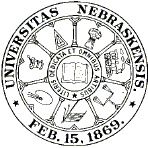
University Studies (University of Nebraska) (1888–1984)
Date of this Version
6-1972
Citation
University of Nebraska Studies: New Series no. 44
Abstract
In November 1968 the Board of Regents of the University of Nebraska was asked to react to a document coming from a faculty-student committee charged with examining the feasibility of establishing an innovating college on the Lincoln campus. It attempted to spell out the need for such innovation, and it offered a plan for fulfilling the need that it delineated. This is that document:
1
Within the past generation a new kind of student, a new kind of faculty, and a new kind of university have developed. To meet the challenges which these changes present and to provide for an educational and national future whose nature is unforseeable, many persons have concluded that there is a need for experiments in university curriculum and organization. The purpose of such endeavors should be a graduate who is sharply aware of himself, his society, and his world, able and desirous of continuing his liberal and professional education beyond the classroom.
The New Students
Students who come to the University are different from those who came twenty years ago.! A larger number of high school graduates choose to enroll than before and, of those who come, a larger number graduate. Though the numbers are greater, their quality is not inferior often. Television and other instruments of mass communication have provided them with astonishing funds of miscellaneous information, some of it inaccurate, much of it irrelevant, and part of it useful. In addition, many have traveled widely. The new students come to us with new formal preparation. High school science programs have been set up by distinguished scientists, the "new math" has become widespread-and public school English has undergone elaborate revision. In the future, advanced placement programs promise to change drastically the relation of entering students to the University.
Perhaps more important, the temper of the undergraduates seems to be changing. The students have learned to react quickly to situations far from home ground, and echoes of Vietnam and Berkeley can be heard in Lincoln. In some universities the students have not hesitated to bite the hand that presumes to feed them, and generally students are becoming increasingly critical of their courses, professors, and colleges. They complain that universities have made them numbers on IBM cards, anonymous to teachers and advisers, and a gray mass to their administrators. They resent a lack of individual attention. For the past two years-at least responsible students through their official channels (e.g. ASUN [Associated Students of University of Nebraska]) have undertaken to scrutinize university programs. It is significant that the disgruntled students are not the weakest. The most critical are often the brightest, the most committed socially, and the most responsible morally. The best seem to be the most critical.


Comments
Published by The University at Lincoln